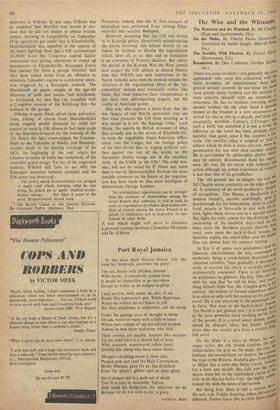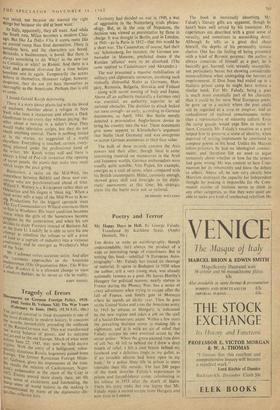The Wise and the Whizzers THERE are some novelists—not generally
the Mast applauded—who seem less concerned with rilke latest boundary of consciousness than Witt' ground already covered. In one sense the novel must always move forward and the novelist al: ways concern himself with an extension 01 awareness. He has no business rewriting nov.els„ already written. On the other hand a geniall" tremor at the frontier is a rare occurrence, re: served for one or two in a decade, and those rlOI necessarily novelists. Camus's L'Etranger Was such a work, but sbmehow it is not a novel. Its influence on the novel has been, perhaps, rnall harmful than good, since it has supplied a f;//' mula. The novelist today is tempted to 'pick 3 subject which he feels is more relevant, more re- presentative for our time than another subieeb1' He is surrounded by philosophic clichés whie. may be entirely disconnected from his exPe% ence. He may fill his novel with violence ae action although his actual experience of violence is less than that of his grandfather. The 'old ground' has its dangers too and Mr' Sid Chaplin seems constantly on the edge of the°, all. A summary of his novel produces a sbudde'a of recognition: Tim Mason, a blacksmith info modern foundry, marries unwillingly, goes 'II Scarborough for his honeymoon, stays in a Pa? hotel, returns to Newcastle to stay with his 11/; laws, fights them, moves out to a squalid Wale flat, fights his wife, yearns for the drinking ca11:: panionship of his bachelor days—and so c).; Once more the Northern accents (heavier tha,c ever), once more the back-to-back houses, tac, Saturday nights, the motor-bikes and the to° One can almost hear the cameras turning. At first it all seems very sentimental and d.e0. liberately old-fashioned, the only concession modernity being a crash-helmet decorated wl'a coloured transfers. Then gradually it becornesn, study of married life which is carefully and a sentimentally examined. There is no hurrYirlagi no avoidance, no glibness. The boy, Tim, sets with the idea that 'he will be boss,' and evelo'r thing follows from that. Mr. Chaplin goes realism : the realism of formed experience is so often at odds with the realism of the carrv„( novel. He is not interested in the picaresque, rie..'. in farce. Nor even in the back-to-back hotlsere The North is not gloated over : it is simplY tii11'e5 as the most powerful force working on the 1.
of the people. It is a novel about people, .fig torted by abstract ideas, but finally more than one usually gets from a modern Elio lish novel.
On the Make is a story of Milan, the veaux riches, the old, soused families, the fi,he industrialists, the girls on the make, the artY., `_"s, lesbians, the second-hand car dealers, the castiliv% the trips to the Riviera. Arabella goes from to Milan like a latter-day Sister Carrie, locm,"`; for a man and wealth. She fails and the S.It:bc moves from her to the interlocked circles 011;i5, rich. A bit like La DoIce Vita: the highlY soP ticated life with the hints of perversion.
bout
But being Italy there is still a naivete a the new rich. Unlike America, where the sins fro different. Dreiser knew this in 1914. Sister Cal
THE SPEC't Al opt NOVEMBER 16 was saved, not because she wanted the right things but because she did at least want.
In Italy, apparently, they all want. And while the South rots, Milan becomes a modern Chic- ago. But like La Dolce Vita it seems more like an amoral romp than final damnation. There is boredom here, and the characters are bored. Bernardo, a businessman, is bored. But there is always something to do. Whiz! in the new car to Cattolica or whiz! to Rimini. And there is a brief and genuine diversion for a time before boredom sets in again. Temporarily the actors believe in themselves. However vulgar, however desperate, they do not yet hate themselves as thoroughly as the Americans. Perhaps that is still to come.
found Gerald Kersh depressing.
There is a story about plants fed w;th the blood 01 madmen: Another about a refugee in New York who runs a restaurant arid allows a Dark Gentleman to eat every day without paying. An- other about a mix-up in a tailor's shop. They would make television scripts, but they do not touch anything central. There is nothing hinted at in the stories, no suggestion of a world elsewhere. Everything is touched, certain, every- thing planned under the professional hand of the writer. Mr. Kersh writes well and there is always a kind of Poe-ish invention (the opening Of secret panels, the plants that make men mad) which keeps the pace going. Bc'orntown, a satire on the Mid-West, lies somewhere between Babbitt and those new exe- c!tives who are psychoanalysed ahead of time. Willard T. Watney is a Kiekapoon rather than an _w rbitarian and his slogan is `think big.' When a local writer sells a saga of the Mid-West to Koe- nig Productions for the biggest spectacle since J. Ile Ten Commandments Willard convinces them It film M Westboro. His heart eondition becomes Worse when the girls of the hometown become 13,regnant by the cameramen, and when his son uateeides to study Forestry instead of Business Ad. the State U. Luckily he is able to turn his one attempt at rebellion (he refuses to sell a piece n 'and to a captain of industry) into a virtuous "nformity and he emerges as Westboro's Man 01 the Year.
..1.Mr. Cushman writes accurate satire. And after .11 e traumatic approaches to the American nt-ts.i.oessman (The. Organisation Man, 7"he White niur Worker) it is a pleasant change to meet el modern Babbitt, be he never so vile in reality.
JOLIN DANIEL







































 Previous page
Previous page